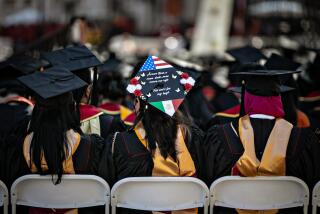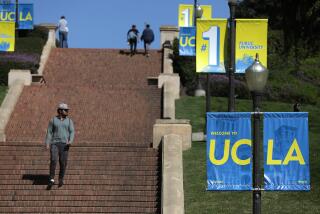University Programs Vulnerable
- Share via
KANSAS CITY, Mo. — James B. Wiggins, outgoing executive director of the American Academy of Religion, warns that programs in religion are among the most vulnerable at colleges and universities in the United States, despite recent growth.
Success stories about campus religion programs make him uneasy, Wiggins said, because religion in the classroom financially competes with that “other religion” at universities: sports.
Wiggins, professor of religion at Syracuse University, focused on the issue of religion in higher education during an address recently to the joint annual meeting of the academy and the Society of Biblical Literature.
Religion, as a relatively young field in higher education, hasn’t sunk its roots in deeply enough to safely ride out budget cuts sparked by the recession, Wiggins said. “It’s unthinkable to not have a biology department, but it is thinkable that a religion department is expendable,” he said.
During his nine-year tenure, Wiggins has presided over the greatest growth in the 82-year-old academy’s history. Membership in the past nine years has nearly doubled from 3,200 to almost 6,200 professors, researchers and students, and many new fields of research have been added, dealing with many aspects of religions around the world.
The academy has provided a forum for sometimes obscure research, and grateful scholars have responded by volunteering to help the organization, Wiggins said.
He said he is optimistic about long-term development of religion scholarship, but he expressed doubts about the immediate prospects for better funding of religion teaching and scholarship in higher education.
That enthusiasm has spilled over into higher education. Graduate programs have multiplied, college religion courses have swelled classrooms, and religion has become more integrated with other disciplines.
Nevertheless, Wiggins said, many colleges and universities employ only two, three or four professors in their religion departments, and those departments are easy targets. “I think we’re in a real vulnerable spot,” he said.
That vulnerability isn’t helped by a conservative shift in religion, said Wiggins, who describes himself as having “an incurable liberal bent.” American religion grew more private and self-centered through the 1980s, he said.
“We’ve seen a decade of increasing conservatism in religion, a less vigilant range of social action in religion. That seems consistent with the national mood.”
Despite the conservatism and threatened budget cuts, Wiggins anticipates increased research in Islam, feminist approaches to religion, and African and American Indian religions.
Wiggins’ successor as executive director of the American Academy of Religion is Barbara DeConcini, a religion professor at Emory University in Atlanta.
More to Read
Sign up for Essential California
The most important California stories and recommendations in your inbox every morning.
You may occasionally receive promotional content from the Los Angeles Times.













